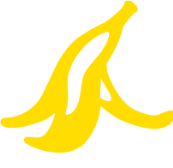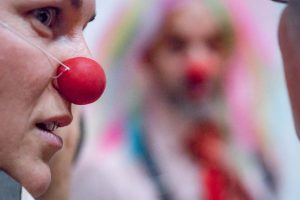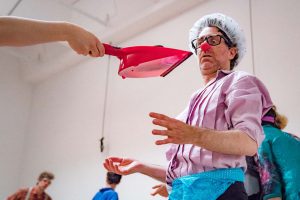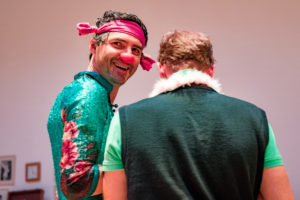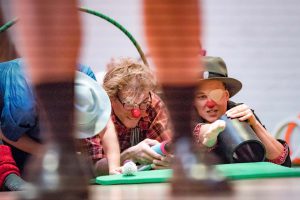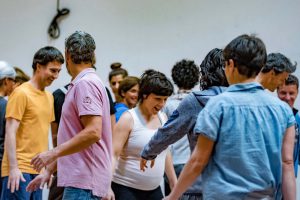Workshops
In our workshops we use play and improvisation to discover and explore different facets of each person’s clown—how they problem-solve, how they fail, and what they do when they inexplicably succeed. The workshops include opportunities for participants to work with partners, solo and in groups, training aspects of clown technique including projection, timing and connection with the audience. We engage the body, voice and imagination in the training, to help each person become more available to the present moment, and we especially aim to create an atmosphere of curiosity, discovery, and play.
Our workshops are open to people with all levels of clown or performance experience, including beginners. We are also available to work with your group.
NEWS
“From the Ground Up” long clown course with Bryce Kasson:
The (Halb)Jahresgruppe January – May 2025 in Cologne was full and fun!
The next group in Cologne, October 2025 – March 2026, is full and registration is now closed.
More info here
Clown Jams
A clown jam is a space for collective improvisation, a laboratory for exchange, reflection and clown practice. Our vision of a clown jam comes from our experience with ‘Punto Fijo’ in Argentina. ‘Punto Fijo’ was initiated in 2012 by clown/teacher Marina Barbera and others (Bryce took part in the first explorations), and was inspired by the jam format of Contact Improvisation. Currently, ‘Punto Fijo’ is a monthly jam in Buenos Aires–a collectively organized research/practice space for clowns to play together. Although sometimes chaotic, it provokes situations for discovering other facets of your clown in free play with others. We are excited to share this format with groups of clowns in other cities and regions where we travel, with the hope that groups will feel inspired to continue the practice on their own.
“It’s not a show; there is no fixed audience. It’s not an open class; there is no teacher. It’s a time to come together, propose a simple pattern of improvisation, and lose ourselves in the game. It’s a creative, collective and collaborative action that doesn’t seek the technique of effectiveness, but rather a state that allows us to access our own material in relation to other people who are interested in the language of clown.”
—Marina Barbera, Argentine clown
